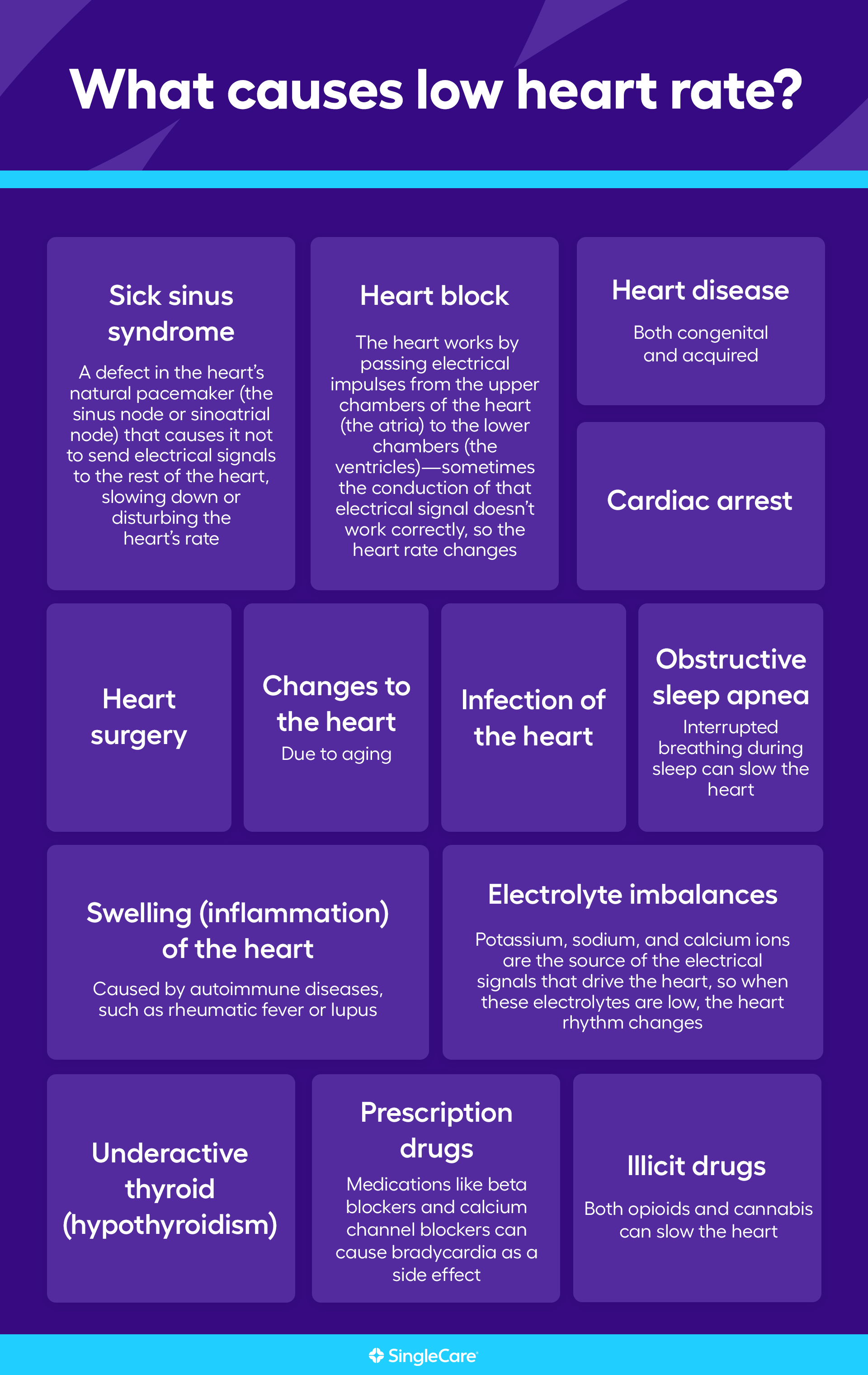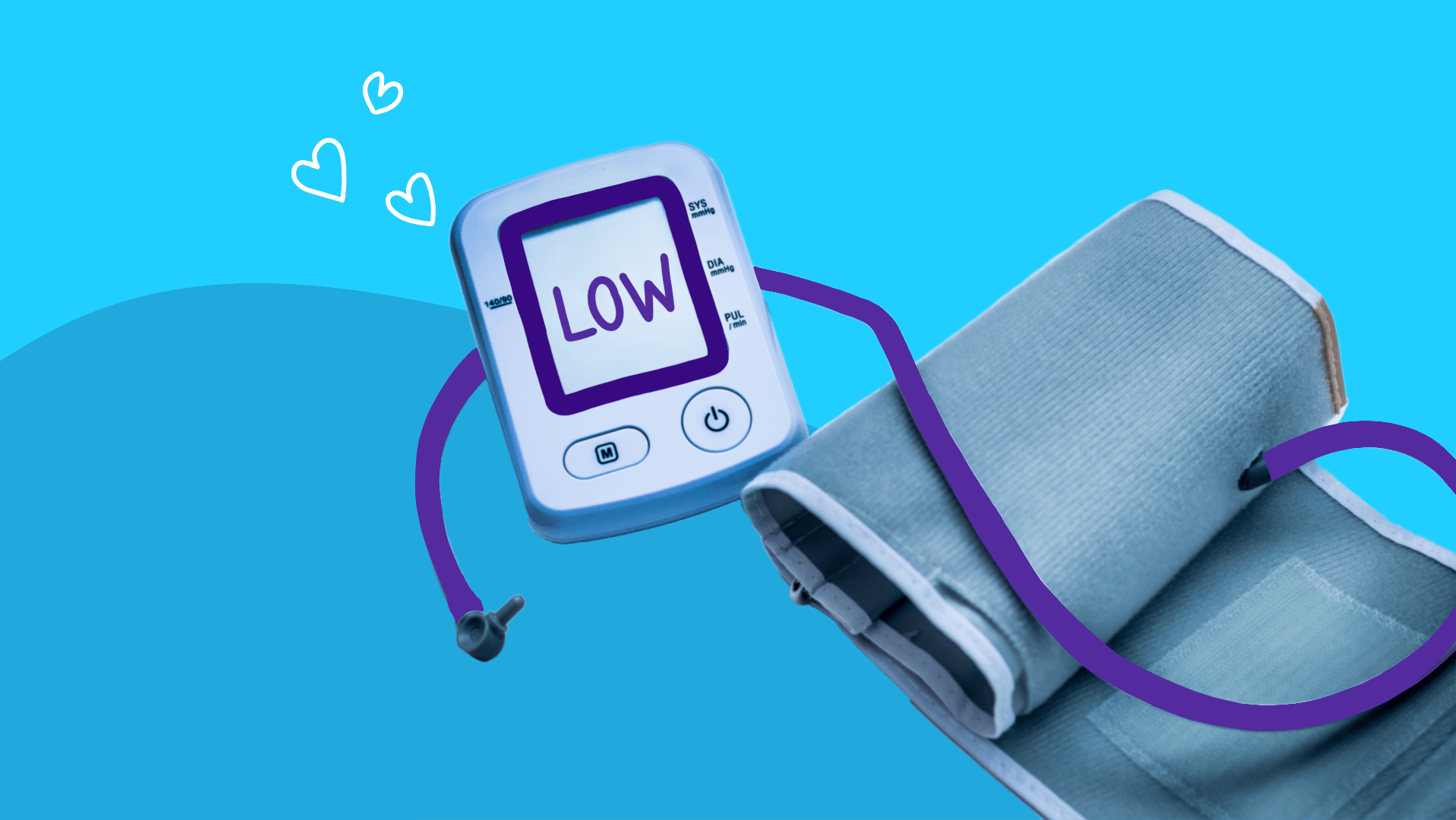Overview: What does low heart rate (bradycardia) feel like?
Low heart rate, or bradycardia, occurs when the heart beats too slowly. Fewer than 60 beats per minute is considered too slow for most people, though a slow heart rate may be normal during sleep or for physically fit people. Healthcare professionals consider bradycardia to be an abnormal heart rhythm problem or arrhythmia. If the heart rate dips below 40 beats per minute, the situation is dire and possibly life-threatening. The danger is the heart is not sending enough blood and oxygen to the rest of the body. Since the most significant demands for oxygen come from the brain, most people experience bradycardia as dizziness, lightheadedness, confusion, memory problems, and, in more serious cases, fainting. Since the rest of the body is also not getting enough oxygen, people with a low heart rate will often feel tired, weak, and physically exhausted after only minor effort. Chest pain, fainting, and heart palpitations are more serious symptoms.
What causes a low heart rate?
The causes of low heart rates are many and varied.

First, heart problems can be a cause of bradycardia:
Sick sinus syndrome: a defect in the heart’s natural pacemaker (the sinus node or sinoatrial node) that causes it not to send electrical signals to the rest of the heart, slowing down or disturbing the heart’s rate
Heart block: the heart works by passing electrical impulses from the upper chambers of the heart (the atria) to the lower chambers (the ventricles)—sometimes the conduction of that electrical signal doesn’t work correctly, so the heart rate changes
Heart disease: both congenital and acquired
Cardiac arrest
Heart surgery
Changes to the heart: due to aging
Infection of the heart
Swelling (inflammation) of the heart: caused by autoimmune diseases, such as rheumatic fever or lupus
Other low heart rate causes that are not specific to a heart problem include:
Electrolyte imbalances: potassium, sodium, and calcium ions are the source of the electrical signals that drive the heart, so when these electrolytes are low, the heart rhythm changes
Obstructive sleep apnea: interrupted breathing during sleep can slow the heart
Underactive thyroid (hypothyroidism)
Prescription drugs: medications like beta blockers and calcium channel blockers can cause bradycardia as a side effect
Illicit drugs: both opioids and cannabis can slow the heart
Low fetal heart rate
A fetal heart rate should be more than 100 beats per minute. If it’s slower than that, it can be dangerous to the fetus. However, it’s normal for the fetus’s heart rate to slow down temporarily due to uterine contractions that occur early in a pregnancy.
Hypoxic bradycardia—a low fetal heart rate in which not enough oxygen is getting to the baby’s body—is very serious and potentially fatal. It usually happens late in a pregnancy or during labor. The usual causes of hypoxic fetal low heart rate are:
Compression of the umbilical cord
Low blood pressure in the mother
Low oxygen levels in the mother through exercise or overexertion
Fetal head compression
Overly frequent uterine contractions (uterine hyperstimulation)
Placental problems or rupture of the uterus
Low fetal heart rate that is not threatening (called baseline fetal bradycardia) can be caused by:
Low fetal heart rate sources:
Should I be worried about a low heart rate?
Left untreated, a slow heartbeat can lead to serious complications, including heart failure, frequent fainting, injuries from falls or accidents, and, in the worst cases, a heart attack. However, a slow heart rate that is only marginally or occasionally slow shouldn’t be a cause for worry. For example, it’s normal for people who are physically fit to have a slower-than-normal heart rate. It’s also normal for the heart rate to slow down during deep sleep. See a healthcare professional if you are worried about symptoms of a low heart rate, and definitely see a doctor if you are experiencing lightheadedness, fatigue, or heart palpitations. Chest pain or fainting may warrant a trip to the emergency room.
How is the cause of low heart rate diagnosed?
If the symptoms of bradycardia are present, a healthcare professional will perform a physical exam, take a medical history, and listen to the heart. The doctor may ask about current health conditions and any drugs being taken. Diagnosing the cause of low heart rate will require an electrocardiogram (EKG or ECG) and sometimes a real-time ultrasound of the beating heart called an echocardiogram. This will allow the healthcare provider to see the heart working in real time.
How long does low heart rate last?
Depending on the cause, a low heart rate may be temporary or chronic.
How to stop low heart rate
If a low heart rate is near normal or happens only occasionally, it may not be necessary to seek treatment. If a slow pulse is causing symptoms, such as dizziness, weakness, and low energy, see a healthcare provider.
Doctors treat low heart rate by addressing the underlying cause.
For heart problems, this may involve heart medications, surgery, or a pacemaker.
For drug-induced low heart rate, the healthcare provider will switch to a different medication that doesn’t slow the heart.
For an electrolyte imbalance, healthcare professionals will use IV fluids in extreme cases and dietary changes and supplements in milder cases.
An underactive thyroid will be treated with thyroid hormones.
Sleep apnea has several mechanical treatments, but the standard of care involves lifestyle changes, such as weight loss, exercise, and changing sleep positions.
If the heart rate is dangerously low, an emergency room doctor will bring the heart rate back up to a clinically safe level with injections of atropine or, if that doesn’t work, dopamine or epinephrine. Hypoxic low heart rate in a fetus is critical, so the problem needs to be resolved as quickly as possible. In some cases, that may mean delivering the baby.
Living with low heart rate
A low heart rate is usually treated because of the risk of complications. Either the underlying cause will be treated or a pacemaker will be implanted to keep the heart rhythm and heart rate normal. Even then, having a healthy lifestyle can help:
Maintain a healthy weight
Eat a healthy diet
Get sufficient electrolytes from foods or supplements
Exercise, but only under the advice of a healthcare provider
Follow the treatment plan, take required medications, keep all appointments, and report any new symptoms or any worsening of your condition to the healthcare provider
Avoid smoking, drinking, and recreational drugs
Reduce and manage stress
FAQs about the causes of low heart rate
What causes low heart rate variability?
Low heart rate variability is not the same as a low heart rate. It is more complex and can lead to serious complications. It describes a condition in which the heart rate doesn’t change much. Normally, the heart rate changes to adapt to levels of exertion, stress, or rest. Someone with low heart rate variability will have heartbeats that are more evenly and uniformly spaced than normal. It is most common in people who already have a fast resting heart rate. Why? Because the heart can’t beat much faster when exercising or under stress. Causes of low heart rate variability include pre-existing heartbeat irregularities, heart disease, high blood pressure, diabetes, anxiety, asthma, chronic pain, and certain types of drugs, including beta-blockers, opioids, sedatives, and antidepressants.
What causes high blood pressure and low heart rate?
High blood pressure normally causes the heart to beat faster because the heart has to work harder to pump blood. If the heart is beating slowly in the face of hypertension, it may be due to blood pressure medications like beta blockers or calcium channel blockers that slow down the heart. It may also be due to thickened heart muscles, a condition that can speed up or slow down heartbeats.
Does COVID-19 cause low heart rate?
COVID-19 can infect the heart, causing swelling that can change the heart’s rhythm or rate and even lead to heart failure. The risk of heart inflammation from COVID is low (about 0.1%), but the risk of COVID-related heart rhythm problems is slightly higher (about 2%).
What deficiency causes low heart rate?
Low electrolytes—particularly low sodium, potassium, or calcium—can cause a low heart rate and other heart rhythm problems.
What causes low resting heart rate?
Some people may normally have a low resting heart rate because they are young or physically fit. For others, a low heart rate may be due to a spectrum of causes: heart damage due to aging, cardiovascular disease, electrical malfunctions in the heart, underactive thyroid, infections, electrolyte deficiencies, prescription drugs, and recreational drug use.

